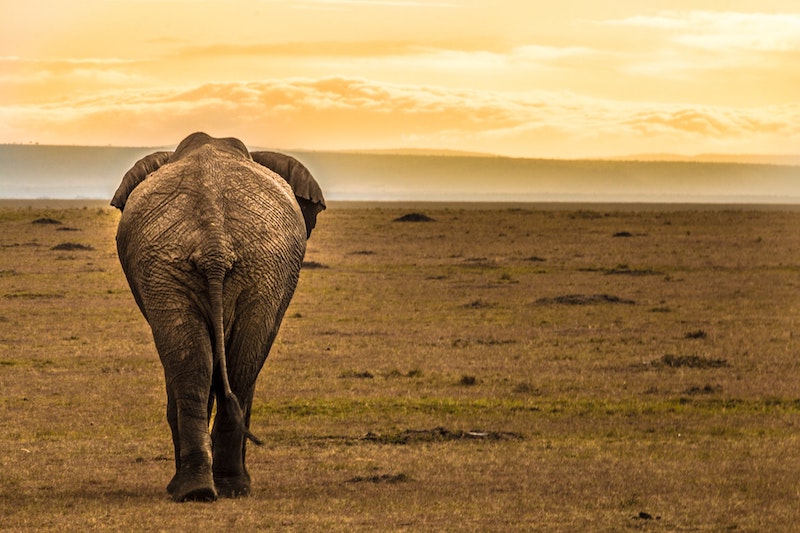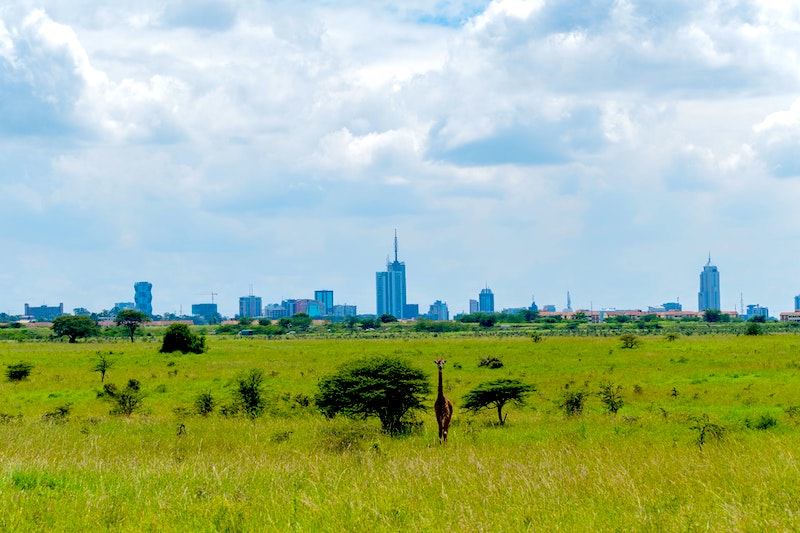We, digital nomads, are usually an adventurous bunch and rarely afraid to step out of our comfort zones, otherwise, let’s face it, we would most likely be doing regular desk jobs.
While the world’s most popular remote work destinations like Lisbon, Mexico City, Bali, Barcelona, Madrid…etc continue to attract digital nomads in droves there are the slightly more adventurous and curious who are looking for something fresh, upcoming and original.
In that spirit, we are featuring Nairobi, the capital of the East African nation of Kenya as a remote work destination to consider or even a place to go develop and test your new startup.
Some highlights of Nairobi as a digital nomad/startup destination
- Access to fast internet
- Nairobi has not been overrun by digital nomads yet
- The opportunity to discover the amazing wildlife
- Experience the unique East African culture
- Nairobi is an up-and-coming digital hub
- Plenty of opportunities to tap into the potentially huge African market if you are an entrepreneur
- A great jumping-off point to visit nearby Tanzania, Uganda and Zanzibar and of course the former capital, Mombasa, its lovely beaches and old narrow streets that are full of history.
A bit of background on Nairobi, Kenya
Nairobi is the capital of the East African nation of Kenya or officially the Republic of Kenya. Nairobi became the capital of the former British East Africa in 1907, taking over from the port city of Mombasa. Nairobi was founded in 1899 as a rail depot on the train route linking Mombasa and Uganda. In 1963 Kenya gained its independence and became a republic. Nairobi has a population of around 4 million and is the 13th largest city on the African continent. The local currency is the Kenyan Shilling (Ksh) and the timezone is GMT+3.
Nairobi, the Silicon Savannah of Africa
Nairobi is rapidly gaining a reputation as an African high-tech hub and has garnered the name ‘Silicon Savannah’, a nod to the tech startup scene from the original Silicon Valley in California, only in this case, the startups are surrounded by stunning safari lands, elephants, giraffes and lions.
Many of the big tech companies already have a presence in Nairobi including Microsoft, Amazon AWS, Facebook, IBM and Google to name a few. While Silicon Savannah is not likely to take on the might of Silicon Valley anytime soon, it is a rapidly growing and exciting place to be right now, especially considering the huge amount of untapped opportunity Africa holds as a continent.
What seems to be particularly exciting is the combination of fintech and socially-oriented projects that are not just providing convenience or a wider choice for consumers but solving real problems in a place where infrastructure and basic technology are still sadly lagging when compared to the more developed nations.
These homegrown startups are in many ways the future of Africa, helping to pave the path toward Africa reaching its true potential whilst solving problems at a grassroots level. These local startups play a massive part in providing quality employment and the prospects of a brighter future to the youth.
Get access to some of the fastest mobile internet speeds on the planet!
It all begins with fast and stable internet. A massive step in the right direction for remote workers and startups has been the implementation of an undersea fibre optic cable network that allows the delivery of some of the fastest mobile internet speeds in the world! A sixth undersea fibre optic cable provided by Telkom Kenya cable has arrived in the port city of Mombasa and will further help Kenya connect with the rest of the world and deliver the high-speed internet capabilities needed to propel Kenya’s digital economy forward.
Co-working spaces in Nairobi

Remote workers need somewhere to work from, where there’s fast stable internet, comfy seating and tea and coffee on offer. Luckily there are already plenty of modern co-working spaces available to work from in Nairobi, from hot desks to dedicated coworking spaces and private meeting rooms available as needed. They can usually be booked on a daily, weekly or monthly basis. The typical price of daily access is in the region of 2,000 Ksh, approximately $17.
Some of the best coworking spots for remote working in Nairobi, Kenya
Nairobi Garage – Nairobi Garage is the pioneer co-working space operator in Nairobi and has several co-work spots across the city including in the popular Westlands area and also Karen, Kilimani and Spring Valley. Nairobi garage offers co-working spaces, meeting rooms, a club space and also private offices. Hot desks offering 24/7 access 4 days a week cost 11,000 KSH + VAT per month, approximately $94. There is also a day pass option, offering access from 8 am to 6 pm and costs 2000 KSH + VAT, approximately $17. In addition, there are 5 day and 10 day packs. All options include tea and coffee and high-speed internet.
Pallet Cafe, Lavington – The Pallet cafe is part co-working space, part healthy cafe, part yoga studio, art studio and meeting point. Aside from offering tasty, healthy food options, one of the things that makes Pallet Cafe stand out is the fact that the owner purposefully hires hearing impaired people, in fact at least 6 out of 10 wait staff are hearing impaired. This is such a wonderful initiative and a venture that really deserves to be supported. A day pass costs 1200 KSH per person (approximately $10) and a monthly plan costs 10,000 KSH per person (approximately $85)
Ikigai, Nairobi – The word Ikigai comes from a Japanese concept and refers to one’s reason for being and the discovery of such brings satisfaction and meaning to life. Ikigai Nairobi certainly offers the aesthetics, sense of style and calm environment to find ones Ikigai. There are four locations in Westlands, Lavington, Lower Cabete and Riverside. Coworking prices per day are 2000 Ksh (approx $17) offering access from 8.30am to 5pm or there is a monthly pass for 20,000 Ksh (approx $170) that offers 24/7 access to all locations, complimentary, parking and yoga and 2 hours of meeting room space per month.
Nairobi offers a generally cool and comfortable climate
Nairobi is said to have a subtropical highland climate according to the Köppen climate classification. Nairobi sits 1,795 metres above sea level offering cooler evenings, especially during June and July. The warmest months to visit Nairobi are between the end of November and the beginning of March during which time the temperature doesn’t usually exceed 24 degrees celsius.
Transportation in Nairobi can be a bit of a challenge!
Getting around Nairobi is when things start to get a bit tricky, traffic can be really bad, and we’re talking really bad, adding considerable time to a journey.
Every city in the world has its transport icons, New York has the yellow cabs, the UK has black cabs and the famous red buses and Nairobi has its Matatus. Matatus are shared minibuses that are part of the informal public transport offering of the country. One of the things that makes Matatus stand out is the graffiti art adorning the outside. Nairobi simply wouldn’t be Nairobi without them.
Riding on a Matatu surely has to be an experience in itself however they are pretty freestyle and not for the faint-hearted, they are often overloaded and the driving style may not suit the nervous!
While relatively safe it would be wise to keep an eye on valuables as pickpockets have been known to operate. If the idea of Matatus is too much, you can always grab an Uber!
Things to do in Nairobi

While Nairobi is already a thriving metropolis with its own distinctive flavour and cultural mix, there are plenty of things to do outside of the city also. No visit to Kenya would be complete without a safari of course and also enjoying the beautiful wilderness that makes a visit to Kenya unforgettable. Below we have listed a few of the things to do while visiting Nairobi.
Nairobi National Park
One of the things that makes the capital city of Nairobi special when compared to other capitals is the fact that there is a huge safari park on the outskirts of the city. Rugged nature against the backdrop of city skyscrapers! The over 100 mammal species include Buffalo, Giraffe, Lions, Leopards, Baboons, Zebras, Wildebeest, Cheetahs and the endangered black Rhino to name a few
Visit the Karen Blixen Museum, the former home of the Out of Africa writer
Karen Blixen was the Danish writer who wrote ‘Out of Africa’ and the museum is her former home found at the foot of the Ngong Hills. Karen Blixen lived there between 1914 and 1931. If you are a fan of the book or the movie Out of Africa, it would be well worth adding this museum to your list of things to do in Nairobi. The museum is at the end of Karen Road and is about 16km from Nairobi city centre. The museum can be accessed via either Ngong and Langata roads.
Giraffe Centre
Giraffe centre is home to the endangered Rothchild’s giraffes and supports essential conservation work and education programs across Kenya. Go feed giraffes from a treetop platform and enjoy the beautiful nature trails.
Sheldrick Wildlife Trust
The Sheldrick Wildlife Trust, founded in 1977 is dedicated to the protection and rehabilitation of African elephants and black rhinos helping to save injured and orphaned animals in the wild and getting them returned to their natural habitats. The Sheldrick Wildlife Trust operates within the Nairobi National Park
Lake Naivasha
Lake Naivasha is situated high in the Rift Valley ridge, close to Nairobi. It is home to a wide array of wildlife including exotic birds, hippos, zebras, giraffes and buffalo. Enjoy the wetland flora and stunning nature
Hell’s Gate National Park
Hell’s Gate National Park covers approximately 68.25 square kilometres or 26 square miles and was the inspiration for the Disney feature, The Lion King. Hell’s Gate National Park is the only safari park in East Africa where you are able to get out of your safari vehicle and hike freely. Hell’s Gate National Park operates between 6am and 6pm daily. Kenyan citizens and residents pay 250 Ksh (adults) and 200 Ksh (children) while non-residents pay $20 (adults) and $15 (children)
Ol Pejeta Conservancy
Ol Pejeta Conservancy is a wildlife sanctuary housed on a former beef ranch from colonial times. The 90,000 acre savannah preserve is home to plenty of wildlife including East Africa’s largest black rhino population and the last remaining northern white rhinos in the world
Mt. Kenya
Mount Kenya is a UNESCO world heritage site surrounded by stunning wilderness, lakes, forests, glaciers, tarns and rare animal species. Mount Kenya is a volcanic peak that rises to 17, 057 feet / 5,199 metres and is primarily a climbing and hiking destination attracting visitors from all around the world.
Key facts to know when visiting Nairobi, Kenya
Languages spoken – Swahili and English
Main airport – Jomo Kenyatta International Airport
Currency – Kenyan Shilling (Ksh), 100 Ksh is roughly $1
Timezone – East African Time (GMT + 3)
Electrical socket type – UK 3 pin plug
Voltage – 240 volts / 50 hertz, appliances that work in the UK, Europe, Australia and much of Asia that work on 220 – 240 volts should work fine.
Internet quality – High speed available in many places, some cafes may be on the slow side but ok for non data intensive tasks. Hotels and dedicated co-working facilities are good places to start.
Safety index 41.13– there are always risks imminent from terrorism, kidnapping and violent crime, careful, take extra care after dark and avoid potentially dangerous non tourist neighbourhoods unless with a local guide. For more info visit https://www.numbeo.com/crime/in/Nairobi
Entry To Kenya And Visa Requirements
Visa Exemption Countries
If you’re a citizen of the following countries, you can travel to Kenya without a visa for up to 90 days:
Bahamas, Barbados, Belize, Botswana, Brunei, Burundi, Cyprus, Dominica, Ethiopia, Fiji, Gambia, Ghana, Grenada, Jamaica, Kiribati, Lesotho Malawi, Malaysia, Maldives, Mauritius, Namibia, Nauru, Papua New Guinea, Rwanda, St Kitts & Nevis, St. Lucia, Saint Vincent & Grenadines, Samoa, San Marino, Seychelles, Sierra Leone, Singapore, Salomon Islands, South Africa, Swaziland, Tanzania, Tonga, Trinidad & Tobago, Tuvalu, Uganda, Vanuatu, Zambia, and Zimbabwe.
Embassy Application Requirement
Citizens of the following countries are required to obtain their visa via their local embassy:
Afghanistan, Armenia, Azerbaijan, Cameroon, Eritrea, Iraq, North Korea, Kosovo, Lebanon, Libya, Mali, Palestine, Senegal, Somalia, Syria, Tajikistan, and Yemen.
East Africa Tourist Visa
This is a combined 90 day single entry visa for Kenya, Uganda, and Rwanda and allows you to travel freely between Kenya, Uganda and Rwanda for up to 90 days and costs $100.
Safety in Nairobi
It is, of course, possible to travel to Nairobi and have a trouble-free stay as will most likely be experienced by the majority of visitors, however, the risks of terrorism, violent crime, kidnapping and so on are always sadly lurking in the background. If you stay in highly visible, tourist areas you should be fine, especially during the day.
After dark, it is not advisable to walk the streets alone, especially in neighbourhoods you don’t know. Kenya is still a relatively underdeveloped country and has many problems to overcome. It is however taking strides to improve and shouldn’t be eliminated from your list of places to remote work from, especially if you are already familiar with travels to other not-so-safe countries.
Below are links to official travel advice from the UK, the USA and Australia to give you more detailed travel advice before you make your trip to Nairobi.
United Kingdom – https://www.gov.uk/foreign-travel-advice/kenya
Australia – https://www.smartraveller.gov.au/destinations/africa/kenya
Nairobi wrap up
Kenya and Nairobi in particular are beautiful culture-filled destinations that are sure to provide remote workers with plenty to see and do and a genuinely original experience. As Kenya transforms itself into a modern high-tech country it is worth visiting and experiencing all that this beautiful country and its wonderful people can offer, especially now, while modern Kenya is on the way up!

